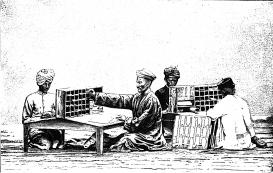My project focuses on the paper technologies, the labor, and the practices involved in producing printed results of census taking before the arrival of punch cards and Hollerith machines in 1889. My particular focus is Prussia, the biggest and most powerful of the German states, which developed a unique system of manual abstraction of census records, intimately intertwined with core social values and political rationales.
"Housewifery Skills" explores how mid nineteenth-century paper technologies used in population statistics triggered a dramatic change in the practices of manual census compilation, transgressing established boundaries of class and gender. Instead of following its mandate to provide additional income to retired servicemen, the Prussian census bureau came to rely heavily on the skills of middle-class wives, widows, and unmarried female staff working from home, creating virulent tensions among its clientele of veterans. The project shows how notions of gender, skill, and class were weighed against entitlement through military service, providing evidence of how paper-based practices in data processing became defined as a female domain—long before punch cards and computers arrived on the scene.

